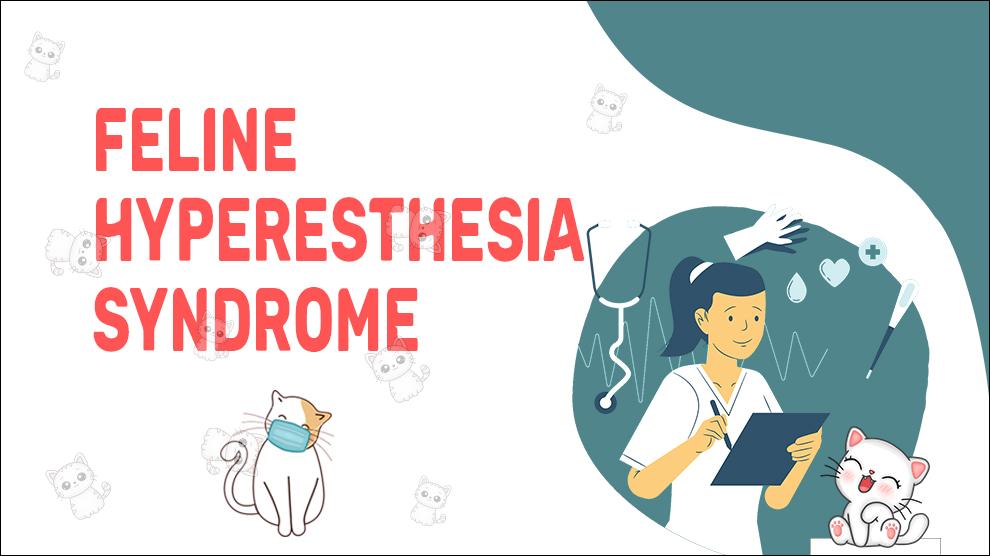What Is Feline Hyperesthesia Syndrome?
Feline Hyperesthesia Syndrome (FHS) is a rare and poorly understood condition that affects cats. It is also known as "rolling skin disease" or "twitch-skin syndrome."
The condition is characterized by sudden episodes of bizarre behavior, which can include vocalization, biting at the tail or back, self-mutilation, and a rippling of the skin along the back.
The cause of FHS is not well understood, but it is believed to be related to a malfunction in the nervous system.
Clinical Signs Of Feline Hyperesthesia Syndrome
The symptoms of FHS can vary from cat to cat, but typically include the following:
- Rippling of the skin along the back
- Bizarre behavior, such as biting at the tail or back, vocalization, or self-mutilation
- Pupil dilation
- Twitching of the ears or whiskers
- Agitation or restlessness
- Sensitivity to touch
- Hair loss or skin lesions from excessive grooming or biting
- Rolling Of The Skin
- Twitching Tail
- Change In Vocalization
- Excessive Panting
- Excessive Licking
- Excessive Scratching
- Frequent Urination
- Excessive Saliva
- Muscle Spasm
- Biting Rear
- Biting Paws
- Lethargy
- Excessive Vocalization
Treatment Options For Feline Hyperesthesia Syndrome
Treatment for FHS may include a combination of medication, behavior modification, and environmental modifications.
Medications that may be used to treat FHS include anti-anxiety medications, antidepressants, and anticonvulsants.
Behavior modification may include training the cat to respond to specific cues, such as a whistle or a toy, and rewarding calm behavior with treats or praise.
Environmental modifications may include providing the cat with a calm, quiet space, reducing exposure to stimuli that trigger episodes, and providing plenty of opportunities for play and exercise.
Home Remedies For Feline Hyperesthesia Syndrome
There are no specific home remedies for FHS, but cat owners can provide their cats with a calm and stable home environment to help reduce stress and anxiety, which may trigger episodes of FHS.
This can include providing a quiet space for the cat, reducing exposure to stimuli that may trigger episodes, and providing plenty of opportunities for play and exercise.
How To Prevent Feline Hyperesthesia Syndrome?
Preventing FHS can be challenging since the cause of the condition is not well understood.
However, there are steps that cat owners can take to reduce their cat's risk of developing the condition.
These include providing a calm and stable home environment, reducing exposure to stressful stimuli, and providing plenty of opportunities for play and exercise.
Affected Cat Breeds Of Feline Hyperesthesia Syndrome
FHS can affect cats of any breed or age, but it is more commonly seen in Siamese cats and breeds with Siamese ancestry.
Causes For Feline Hyperesthesia Syndrome
Causes:
The cause of FHS is not well understood, but it is believed to be related to a malfunction in the nervous system.
It is thought that cats with FHS have an overactive sympathetic nervous system, which controls the "fight or flight" response.
This overactivity can lead to episodes of bizarre behavior and self-mutilation.
When To See A Vet For Feline Hyperesthesia Syndrome?
If a cat exhibits any signs of FHS, such as bizarre behavior or self-mutilation, it is important to see a veterinarian right away.
The veterinarian will perform a physical exam and may recommend additional tests, such as bloodwork or imaging, to diagnose the condition.
If FHS is diagnosed, the veterinarian will work with the cat owner to develop a treatment plan.
Food Suggestions For Feline Hyperesthesia Syndrome
There are no specific dietary recommendations for cats with FHS, but feeding a high-quality, balanced diet can help support overall health and well-being.
It is important to provide plenty of fresh water and to avoid feeding foods that may be irritating or allergenic for the cat.
Conclusion
Feline Hyperesthesia Syndrome is a rare and poorly understood condition that affects cats.
It is characterized by sudden episodes of bizarre behavior, including vocalization, biting at the tail or back, self-mutilation, and a rippling of the skin along the back.
The cause of FHS is not well understood, but it is believed to be related to a malfunction in the nervous system. Treatment may include medication, behavior modification, and environmental modifications.
While there are no specific home remedies or dietary recommendations for FHS, providing a calm and stable home environment and feeding a high-quality, balanced diet can help support overall health and well-being.
If a cat exhibits any signs of FHS, it is important to see a veterinarian right away to diagnose the condition and develop a treatment plan.











